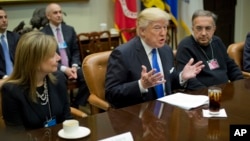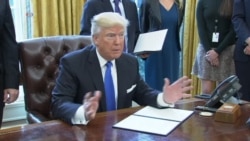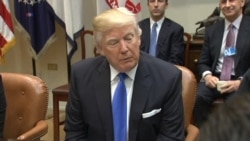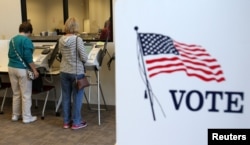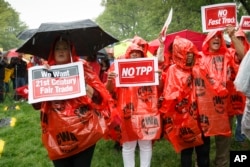President Donald Trump moved Tuesday to advance construction of two oil pipelines in the U.S. heartland, his latest actions to overturn the policies of former President Barack Obama, the nation's chief executive he replaced four days ago.
Trump signed executive orders calling for new negotiations to allow construction of the Keystone XL pipeline, which is designed to carry Canadian oil sands crude through the U.S. to refineries near the Gulf of Mexico, and the Dakota Access pipeline sending oil from the state of North Dakota south to Illinois.
WATCH: Trump signs executive orders on pipelines
After a lengthy review, Obama rejected the Keystone project in 2015 on environmental grounds. Late last year, the U.S. Army Corps of Engineers blocked the Dakota Access project and said it would look for an alternative route after the Standing Rock Sioux tribe and its supporters contended the project would threaten its drinking water and Native American cultural sites.
Trump said the U.S. would renegotiate the terms of the Keystone project with Canadian officials and "if they’d like we’ll see if we can get that pipeline built. Lots of jobs, 28,000 jobs. Great construction jobs."
He also signed an order to require that materials for the pipelines be constructed in the United States.
Trump deplored the length of time it took the U.S. to consider such projects, saying, "The regulatory process in this country has become a tangled up mess."
He signed orders to expedite reviews of environmental concerns and to determine whether or not manufacturing proposals are approved.
Trump had pledged to overturn the pipeline decisions during his lengthy run to the White House. He made good on another campaign promise Monday, withdrawing the U.S. from the 12-nation Trans-Pacific Partnership trade deal, which Obama unsuccessfully sought congressional approval for before leaving office.
Supreme Court appointment
The new president said he would make an appointment next week to the U.S. Supreme Court to fill the vacancy left last year with the death of Justice Antonin Scalia, a conservative stalwart on the court for 30 years.
Trump's pick would replace Obama's choice, the philosophically moderate Merrick Garland, whose confirmation was blocked by Senate Republicans until a new president took office. Trump has been considering a list of 21 conservative judges for the High Court appointment.
Trump also met Tuesday with executives from the Big 3 American automakers, urging them to expand their manufacturing in the United States rather than overseas.
"I want new plants to be built here for cars sold here!" Trump said on his Twitter account.
The meeting with the leaders of General Motors, Ford and Fiat Chrysler marked the second consecutive day the new president has called top corporate leaders to the White House to push for creation of more U.S. manufacturing jobs. In the weeks leading up to his inauguration as the country's 45th president last Friday, Trump criticized U.S. automakers for expanding their operations in Mexico and, he praised them when they announced plans to add jobs in the U.S.
Trump has warned the business executives he will try to get Congress to approve a "substantial border tax," perhaps 35 percent, on companies that move manufacturing out of the country and then bring their products back to the U.S. to sell to American consumers. The new president has promised to "massively" cut government regulations and taxes as a lure to keep American companies in the U.S.
WATCH: Trump's White House meeting with auto execs
Manufacturing plays an important role in the country's economy, the world's largest, but the sector has lost five million jobs since 2000 because of automation and manufacturers moving jobs to other countries in search of cheaper labor. Auto workers in Mexico are paid about a fifth of their U.S. counterparts or even less.
More than 12.3 million U.S. workers currently work in manufacturing, a sizeable number, yet fewer than one in 10 U.S. workers are now employed in factories, compared to a quarter of the labor force in 1960.
But Trump has emphasized the sector in his first days in office after winning the presidency largely because blue collar workers in the country's heartland voted for him in key states that determined the outcome of the election. Many of these workers have become disenchanted with the overall recovery from the country's steep recession in 2008 and 2009, left behind by the globalization of the world economy, still unemployed or working at jobs that pay less than they once earned.
On Monday, Trump asked the leaders of Dow Chemical, SpaceX, the Dell computing firm, the Johnson & Johnson pharmaceutical company, aerospace giant Lockheed Martin and others to come up with a list in the next 30 days of ways to boost U.S. manufacturing.
Later, the Republican president withdrew the U.S. from the 12-nation Trans-Pacific Partnership trade deal, while continuing to make a false claim about the November election.
Unsubstantiated election fraud allegations
Trump insisted at a meeting with congressional leaders that he lost the national popular vote by nearly three million votes to Democrat Hillary Clinton because three million to five million undocumented immigrants in the U.S. cast fraudulent votes for her. Trump defeated her in the Electoral College, the U.S. system of selecting its presidents in which the state-by-state election results determine the winner, not the national vote totals.
There was little evidence of any voter fraud during the election, and certainly not on the scale Trump cited.
Trump has made similar claims before, warning throughout the campaign that the process would be rigged against him. A few weeks after being elected, he wrote on Twitter, "In addition to winning the Electoral College in a landslide, I won the popular vote if you deduct the millions who voted illegally."
Campaign issue
Trump campaigned against the TPP trade deal that was negotiated during former President Barack Obama's term, but never ratified by Congress. It would have covered trade with Japan, Australia, New Zealand, Malaysia, Chile, Canada, Mexico and four other countries.
After signing an executive order to withdraw from the TPP and instead pursue bilateral trade agreements, Trump called it a "great thing for the American worker - what we just did.”
White House spokesman Sean Spicer told reporters that as Trump "has said many times, this type of multinational agreement is not in our best interest, and he’s moving quickly to advance trade policies that increase the competitiveness of the American worker and manufacturer."
Asian and European leaders, however, are attacking Trump's rejection of the Pacific pact.
Australian Prime Minister Malcolm Turnbull said, "There is very strong support among the other 11 parties to the TPP to ratify it and to seek to bring it force."
European Union Trade Commissioner Cecilia Malmstrom said the EU, collectively the world's biggest trading bloc, remains committed to open borders and economies.
"Those who in the 21st century think that we can become great again by rebuilding borders, re-imposing trade barriers, restricting people's freedom to move, they are doomed to fail," Malmstrom said in a speech.




